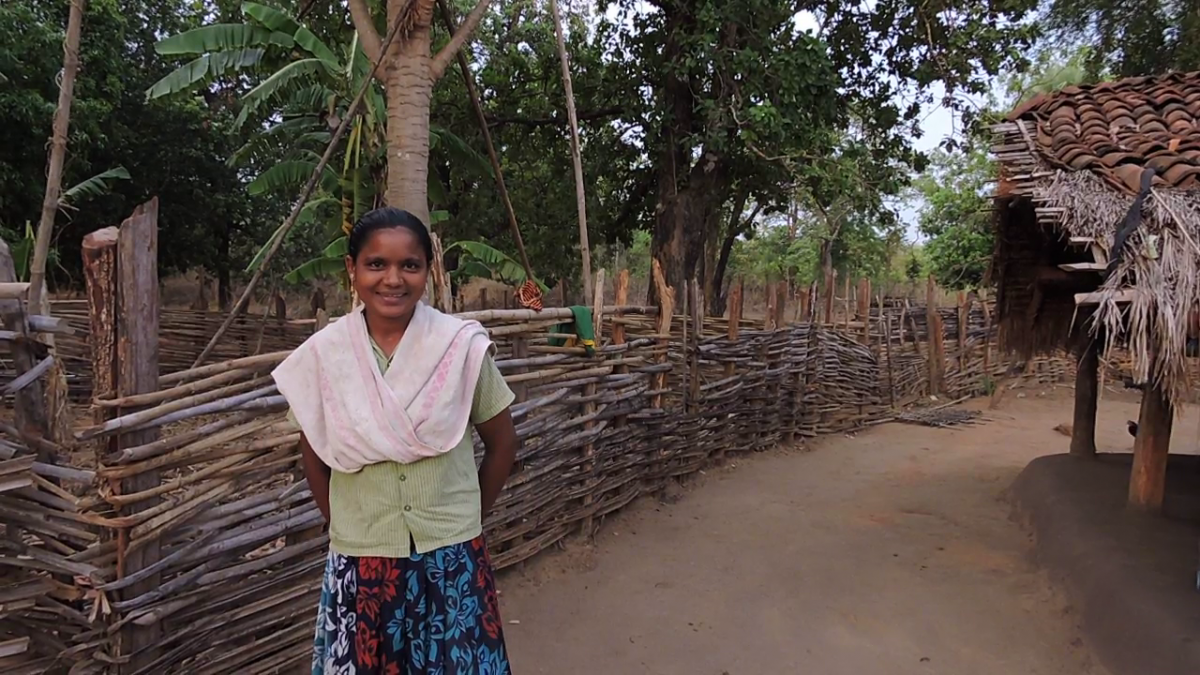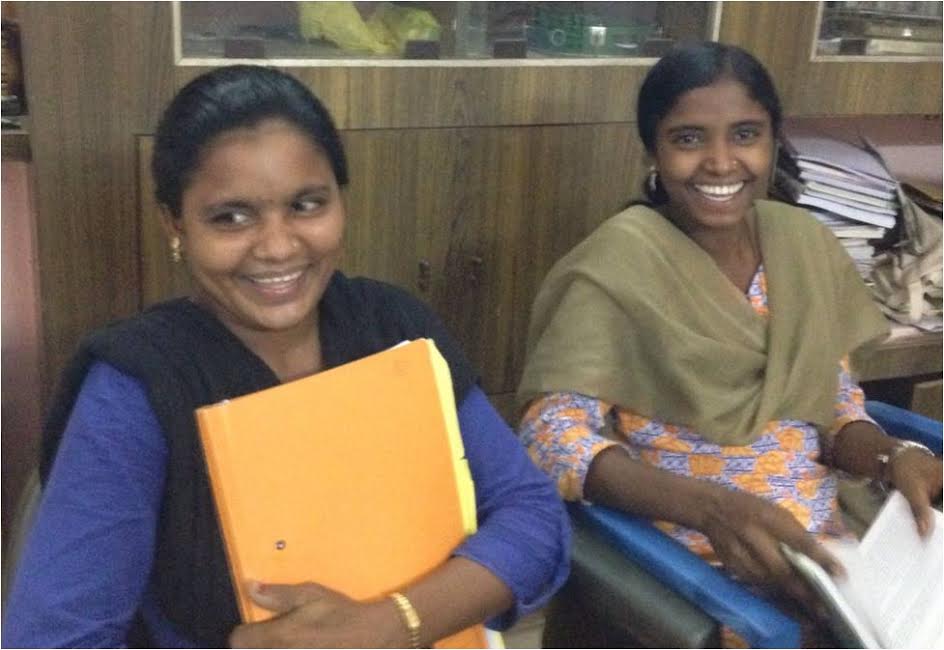
Munni Pottam, 18 years (above)

Suneeta Pottam, 19 years (below)
In a bold and courageous act, two young girls, Suneeta Pottam, 19 and Munni Pottam, 18 years old, have knocked the doors of the Chhatisgarh High Court to seek justice and redressal for the injustices being committed, with impunity, on the Adivasi villagers around them. Hearing the petition that was filed in the third week of September, the Court has granted protection to these human rights defenders (HRDs) and posted the hearing for October 24,after the petitioners provide some clarifications on the status of some cases in the Supreme Court.
The two HRDS are backed WSS, a national women’s organisation, and the petition challenges the police version of encounter killings that have taken place in the area of Gangalur Police station of Bijapur.
These extra-judicial killing have allegedly taken place in the villages of Kadenar, Palnar, Korcholi and Andri. Seetu Hemla was dragged from the fields where he was working with his mother and family members in July 2016; Tati Pande and Manoj Hapka were taken from their home while they were sitting for dinner in May 2016; in February 2016, Kudhami Ganga was shot dead while collecting leaves for a village wedding while a 9 year old boy, Sodi was also presumably killed in the same village as his mother heard gunshots and the security forces hiding something and was never found since then; Sukku Kunjam (of Itavar) was shot point-blank while he was in his relative’s village in November 2015. The long list of atrocities have been covered consistently by Sabrangindia.
Even as the Bastar police celebrate their "success" in having killed over a hundred alleged Naxalites this year, a Public Interest Litigation challenging the spate of encounters in Bijapur has been filed before the Chhattisgarh High Court in Bilaspur. The petitioners are two young women from Korcholi with extra-ordinary grit and determination –Suneeta Pottam (19 years old).and Munni Pottam (18 years old), who have been supported in this effort by a national women's organization, the WSS (wssnet.org) as the third petitioner.
The police version is that the people have died when Naxalites laid ambush to police parties and security forces who were out on anti-Naxal operations. However, several independent fact-finding teams have found that the villagers and family members who had been voicing, independently, their version of the reality: that their people were living out their daily lives when trigger-happy forces have fired on them or deliberately picked them up from their houses, on the false pretext that they were simply being taken to the police station but,then killed them.
This petition highlights the extra-judicial executions of 6 people, which took place in the villages of Kadenar, Palnar, Korcholi and Andri in Bijapur district over the course of the last year. The police acknowledge only three of these incidents as encounters, and in each one of these, they providean almost identical story to the media –that these "encounters" occurred when combined teams of local police and paramilitary forces had gone out on combing operations after receiving "verified information" about the presence of Maoists in the area. In each one of these cases – Kadernar, Palnar and Korcholi – the police claim that they first came under fire, forcing them to return fire – and it was only on searching the area in the aftermath that they stumbled onto the bodies of dead Maoists who had been killed in the exchange of fire. All of these dead Maoists, as per the police accounts, were found conveniently clad in uniforms and lying next to arms, spent ammunition and Maoist literature.
However, the villagers have something completely different to say. Accompanying this petition are sworn affidavits of ten villagers who are family members of the deceased or eye witnesses of the incident, who challenge the police versions. In Kadenar, the villagers talk about how a married couple, Tati Pande and Manoj Hapka, were forced out of their home in the evening at gunpoint, on the pretext of getting them "surrendered" in the Gangaloor police station. In Palnar, SeetuHemla was dragged from the fields which he was ploughing, with his hands tied behind him, in full view of his young wife, mother and other villagers. In Korcholi, the womenfolk witnessed Sukku Kunjam of Itavar being shot point-blank, while he was visiting his relatives house in November 2015.
Surrendered Naxalites were at the forefront of these operations, and have also been used mercilessly by the authorities to threaten and bully family members. It is in this backdrop that this petition that seeks the constitution of a high powered investigative team to look into these so-called encounters, and challenges the use of surrendered militants and committee members in these counter insurgency measures is significant.
The two petitioners, Suneeta Pottam, 19 and Munni Pottam, 18 years old, who are the petitioners have been eye-witness to the repression. As children, they had to leave their girls’ ashram school when the school closed down and teachers abandoned it due to the violence of Salwa Judum in 2005. Their village was also attacked by the Salwa Judum mobs, and their houses burnt down. The girls’ education was stopped mid-way and they began to work in stone quarries to support their families. After all these years and now as young adults, they continue to see the suffering and turmoil in their own village and in areas around them. In the hope of justice, the girls have taken on the onus to bring these injustices of atrocities before local authorities and the courts.
In the remote village of Andri, which is a day's walk from the closest motorable road, the police have not claimed any encounter, nor registered any death. However, the villagers recall that in February of this year, the police party mortally wounded Kudhami Ganga, a young man, by shooting him while he was collecting siyadi leaves for a village wedding. The police team probably never realized that Kuhdami Ganga had succumbed to his injuries some minutes after they shot at him, and never collected his body – hence, this killing probably does not figure in the celebrated "century" of encounters. A few days later, the same patrol team killed or mortally wounded a 9-10 year old boy, Sodi Sannu, who was tending his family's tomato fields. His death too does not figure in the dubious “century” for the obvious reason that it is difficult to pass off an obviously young child as a Naxalite. What has been done with Sodi Sannu's body is a question that still haunts his parents.
Role of Surrendered Militants
While seeking the constitution of a high-powered investigation team to look into not just these documented encounters, but all encounters in Bijapur district over the last year, this petition also challenges the legitimacy of the role of surrendered militants in these search and combing missions. In each one of the incidents detailed in the petition, surrendered militants have been instrumental in identifying and seeking out targets, and in carrying out the executions. Referring to the landmark Salwa Judum judgment in the case of Nandini Sundar and Ors v. State of Chattisgarh, where the apex court laid down that a responsible state cannot use the intense feelings of hatred or revenge in the SPOs personally affected by Naxalite violence as a strategy for counter-insurgency measures, the current petition argues that it is equally dehumanizing and irresponsible to urge and incentivize surrendered militants to seek out and kill their putative former colleagues.
The Alien State
The affidavits included in this petition underline the complete alienation of the residents of these villages from the institutions of the State. The villagers are so deeply distrustful of the police and the paramilitaries that their very presence near the villages sends most villagers fleeing into the jungles and neighbouring villagers, irrespective of the time of night or day. The continuing saga of mass arrests, detentions, beatings, sexual violence and extra judicial executions has taught villagers that spending days and nights in jungles, without food or adequate cover, at risk from wild animals and other dangers, forgoing weddings, funerals and festivals, is a price worth paying for avoiding the police or paramilitary troops, who are likely to cause serious harm to their life, limb or liberty.
The affidavits also reveal that in the few instances where the villagers sought help from the police, they were roundly rebuffed and turned back. Sodhi Hurra, father of the missing 9 year old Sodhi Sunna recalls how the Bijapur police did not even allow him inside the police station when he went to report his missing child. Sukli Hemla, the elderly mother of Seetu Hemla, went to the Gangaloor Police immediately after Seetu had been captured and dragged into the jungles, but they did not lift a finger to help her.
The Petitioners
Suneeta Pottam and Munni Pottam are young women from Korcholi village, the site of one of the “encounters” described above, who came in contact with the women’s organization WSS when a fact-finding team from WSS visited their village in May of this year. Their courage, along with their knowledge of Hindi has propelled them into a role wherein other villagers depend upon them for help in seeking redressals for their grievances and complaints.
As children, Suneeta and Munnihad to give up their studies when their school closed down due to the violence of Salwa Judum in 2005. Their village was also attacked by the Salwa Judum mobs, and their houses were burnt down. With their families reduced to penury, the girls began to work in stone quarries as coolies to support them. After all these years and now as adults, they continue to be sensitive to the suffering and turmoil in their own village and in areas around them, which has given them to courage to seek justice before the High Court.
However, this activism comes at a heavy cost. Even as they were helping villagers record their affidavits in the Bijapur courts for the present case, local police mounted a door-to-door search for them, forcing them to flee to Bilaspur, and approach the High Court for interim relief ensuring their own safety. With the High Court order in hand, these young women have now returned to their village, only to find that in the two weeks that they had been gone, the police parties had returned twice to the village, broken 4 homes and beaten up 3 people.
.
WSS – Women Against Sexual Violence and State Repression – the third petitioner, is a nationwide platform of women’s organizations and individual women, working on issues of sexual violence against women, especially in the context of structures of systemic repression since the past seven years.
For the people of Bastar, living a daily life routine is fraught with risk. Unarmed men and women, wearing their lungi or nightgown, killed and shown as hardcore Maoists killed in encounters. The stories of fake encounters in Maoist cases of unrestrained firing from the Maoists side and the pressure on the police to fire in self-defense is so common that these fictitious scripts require little imagination and are articulated with a straight face by the police to the media. Thus it is easy for the police to dismiss the petition as a lie, but it is for the judiciary and the government to protect the voice and lives of Adivasis.
